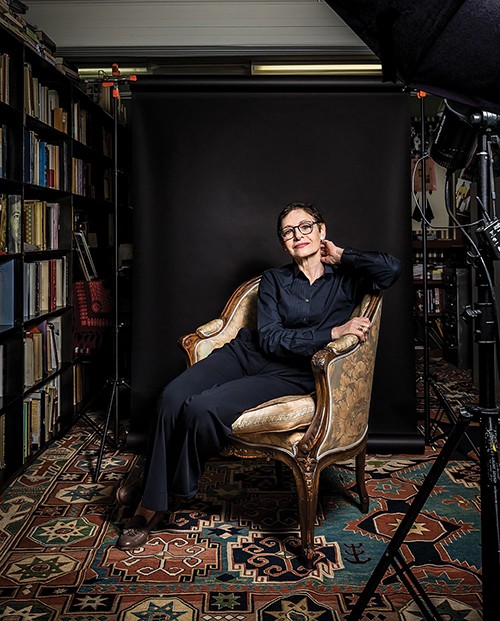On my way to meet The Price of Illusion author Joan Juliet Buck, I suddenly become self-conscious about what I'm wearing, a version of my freelance writer uniform: ratty old jeans, a turtleneck sweater, and beat-up suede Mary Jane flats I bought in 1996.
I mean, I'm about to interview someone who was editor of Paris Vogue from 1994 through 2001; who began her brief marriage to British journalist John Heilpern in a dress made for her by hand by her pal Karl Lagerfeld; who as a young woman had an affair with Donald Sutherland, and flirtations with Tom Wolfe and Leonard Cohen; who considers Anjelica Huston a surrogate sister, and counts Tina Brown, Charlotte Rampling, and Paloma Picasso as friends.
What was I thinking?
But then Buck, 68, arrives to meet me at Rhinecliff's Morton Library, where for the past three years she's rented an office in the basement while living in a small apartment in Rhinebeck. To my great relief, she's dressed even more casually than I am—sweats, a long-sleeve T-shirt, rubber Wellies, and a simple black knit cap atop her signature gamine haircut. On her, the effect is effortless chic.
"Hello!" she calls from across the street in her trans-Atlantic accent, not fully American, but neither fully British or European. "I think you might be looking for me? Joan?"
From the minute we meet, Buck is warm, accessible, and completely down-to-earth, and I'm reminded that her book, although chock full of anecdotes of her brushes with the rich and famous, is all about cutting through the glittering illusions of fame to what really matters. I'm meeting the real Joan, the one who, after spending six years making sense of her life through writing her memoir, has come to consider airs of grandeur hazardous to one's health. This is the no-bullshit Joan, who has taken as a cautionary tale her actress mother's affliction with trigeminal neuralgia—a condition that caused excruciating pain in her cheekbones—after smiling relentlessly through her unhappy marriage and other regrets.
Buck leads me into her writing space. It's a cozy, bohemian den, filled with rare books, journals, and artifacts from a life that has taken her to many rarefied places, filled with boldfaced names. Take the sepia photographic portrait of Clark Gable sitting on her desk, for example.
"That," she says, pointing, "was taken by my father," Jules Buck, a movie producer who for much of his life considered army buddy John Huston his best friend. He also pretty much discovered Peter O'Toole, with whom he'd later partner in a film production company.
Buck's star-studded childhood began in Los Angeles, but was rerouted to Paris during the McCarthy Hearings, when she was three. Soon after, Joan, Jules, and her mother, Joyce—who considered Lauren Bacall her best friend—moved to London, and also spent a fair amount of time in Galway, Ireland, in Huston's home, St. Clerans.
She naturally grew up to become a nomad and jet-setter, briefly touching down at Sarah Lawrence College; the Malibu beach house her best friend, Anjelica Huston, shared with Jack Nicholson; Santa Fe; Milan; the South of France; and back and forth to Paris, where she ultimately landed at Vogue.
She never really wanted the magazine job. "I only took it because I was blocked on my third novel," she recalls. Before Paris Vogue, there were stints at Glamour and Women's Wear Daily, but fashion wasn't really her thing. "This guy I was going out with had ended things with me, it was snowing out, the kitty litter stank, I owed a tax bill, and so I thought, alright, I'll do it."
Although it's been argued that Buck revolutionized the magazine, adding depth to it in various ways, over time she fell out of favor with the powers that be at Conde Nast, Vogue's publisher. They asked her to take a "sabbatical," and curiously ordered her to check into a rehab facility back in the US. Buck knew the break wasn't temporary. This phase of her life was over.
• • •
The subterranean office at the Morton Library is a long way from the tony Paris arrondissements Buck used to inhabit, but it's a comfortable, fitting refuge for the period of her life she categorizes as "post-multiple-shipwreck." Indeed, Buck is living in the wake of some major career calamities.
First there was that ouster from Paris Vogue, and the very public false claim that she had a drug addiction, for which she needed to attend rehab. (People at Paris Vogue thought they saw syringes in Buck's bag and assumed she was on drugs, but they were actually vials of sea water she carried in her bag to balance her electrolytes.)












